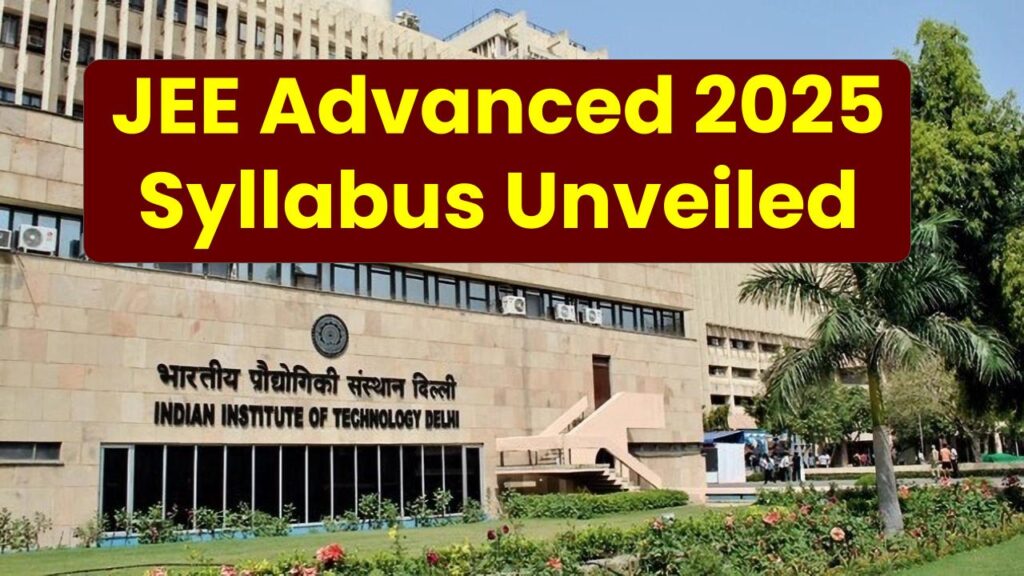As the JEE Advanced 2025 approaches, aspiring engineers are gearing up to tackle one of the most prestigious exams in the country. This highly competitive exam is the gateway to the Indian Institutes of Technology (IITs), one of the best engineering schools in the world. However, to succeed in JEE Advanced, you need more than just determination – you need to know the syllabus inside and out.

Whether you’re a first-time applicant or a seasoned aspirant, understanding the JEE Advanced 2025 syllabus is crucial for your preparation. In this guide, we will walk you through the key topics, provide tips, and explain how you can organize your study plan. Let’s dive in.
Table of Contents
JEE Advanced 2025 Syllabus Unveiled
| Category | Details |
|---|---|
| Exam Date | The official JEE Advanced 2025 exam will be conducted by IIT Kanpur on June 7, 2025. |
| Exam Structure | Two papers: Paper 1 and Paper 2 (both of 3 hours each) |
| Subjects Covered | Physics, Chemistry, Mathematics (Class 11 & 12 topics) |
| Total Marks | 360 Marks (180 marks for each paper) |
| Key Focus Areas | Physics: Mechanics, Thermodynamics, Optics Chemistry: Organic, Physical, Inorganic Maths: Calculus, Algebra, Geometry |
| Official Website | JEE Advanced 2025 Official Website |
| Important Updates | The syllabus is largely consistent with the previous year’s syllabus, with no major changes expected. |
In conclusion, JEE Advanced 2025 is a tough nut to crack, but with the right approach, determination, and understanding of the syllabus, it’s absolutely within reach. The syllabus may seem overwhelming at first, but breaking it down into manageable sections and focusing on high-priority topics will make a huge difference. Use this guide to stay on track with your preparation and keep yourself updated with any new developments.
Remember, consistency and smart study methods are key. Stay focused, keep practicing, and you’ll be ready to conquer the JEE Advanced exam. Good luck!
Introduction to JEE Advanced 2025 Syllabus
The JEE Advanced 2025 syllabus remains aligned with the syllabus of the past years, focusing primarily on three subjects: Physics, Chemistry, and Mathematics. However, each year, the complexity of questions tends to increase, and it’s important to stay updated on any nuances or specific changes.
The syllabus is based on topics from both Class 11 and Class 12 as prescribed by the NCERT curriculum. But don’t worry – we’re here to break it down for you in easy-to-understand sections that make it less intimidating. Whether you’re tackling mechanics, chemical reactions, or solving calculus problems, we’ve got you covered.
Detailed Breakdown of JEE Advanced 2025 Syllabus
Physics Syllabus Breakdown
Physics often strikes fear in the hearts of many JEE aspirants, but with the right preparation, it can be conquered. The syllabus for Physics is divided into eight key units:
1. General Physics
This is the foundation of the subject. Topics include:
- Units and dimensions
- Error analysis
- Measurement techniques
- Practical experiments such as using Vernier calipers and micrometers for measurement.
2. Mechanics
Mechanics is crucial, covering concepts like:
- Newton’s Laws of Motion
- Kinematics in one and two dimensions
- Projectile motion and circular motion
- Work-energy theorem and rotational dynamics
3. Thermal Physics
Involves understanding thermodynamics, heat transfer, and the specific heat capacity of substances.
4. Electromagnetic Waves
This unit includes understanding the propagation of electromagnetic waves and their applications in everyday technology, such as microwaves and radio waves.
5. Optics
Key topics here are:
- Reflection and refraction
- Lenses and optical instruments
- Wave optics such as interference and diffraction.
6. Modern Physics
This unit focuses on the photoelectric effect, atomic structure, and nuclear physics, essential for understanding the basics of quantum mechanics.
7. Oscillations and Waves
A core unit that deals with simple harmonic motion and wave phenomena.
Haryana HTET 2024 Online Form 2025 Reopens—Final Chance to Apply
UPSC NDA 2 Online Form 2025 Live – Step-by-Step Guide to Apply Successfully!
HSSC CET Group C Online Form 2025 Released – Apply Now Before It’s Too Late!
Chemistry Syllabus Breakdown
Chemistry is one of the most scoring sections in JEE Advanced if you get the hang of it. The syllabus is divided into Physical Chemistry, Organic Chemistry, and Inorganic Chemistry.
1. Physical Chemistry
This covers:
- States of matter: Gases and liquids
- Atomic structure
- Chemical equilibrium
- Thermodynamics
- Electrochemistry and kinetics
2. Organic Chemistry
Focuses on:
- Hydrocarbons (alkanes, alkenes, alkynes)
- Aldehydes and Ketones
- Amines
- Polymers and biomolecules
3. Inorganic Chemistry
Involves:
- Periodic table and periodicity
- Coordination compounds
- d-block and f-block elements
Mathematics Syllabus Breakdown
Mathematics is a subject that requires strong problem-solving skills. Here’s a breakdown of the key topics:
1. Sets, Relations, and Functions
Understanding sets, relations, and their properties is essential for solving various problems in mathematics.
2. Algebra
This covers:
- Complex numbers and quadratic equations
- Matrices and determinants
- Sequences and series (arithmetic and geometric progressions)
3. Calculus
Arguably the most important part of JEE Mathematics:
- Limits and continuity
- Differentiation and applications of derivatives
- Integration and its applications
4. Coordinate Geometry
You’ll need to understand straight lines, circles, and conic sections.
5. Vector Algebra
Focuses on the dot product and cross product.
Preparation Tips for JEE Advanced 2025
1. Start Early
The earlier you start, the better. Begin by building a solid understanding of the basic concepts from Class 11 before diving into Class 12 topics.
2. Understand the Syllabus
Familiarize yourself with the entire syllabus. This will help you understand which topics have a higher weightage and need more time.
3. Time Management
Time is a luxury you won’t have much of during the exam. Practice solving problems within time limits to improve speed and accuracy.
4. Use Quality Study Materials
Stick to reliable study materials such as NCERT textbooks, previous years’ question papers, and mock test papers from trusted sources.
5. Focus on Conceptual Understanding
JEE Advanced focuses on testing your understanding of concepts, not just rote memorization. Make sure you truly grasp the fundamental principles.
FAQs
1. What is the exam pattern for JEE Advanced 2025?
JEE Advanced 2025 consists of two papers – Paper 1 and Paper 2. Both are 3 hours long, and they are compulsory for all candidates. Each paper will have three sections: Physics, Chemistry, and Mathematics, with multiple-choice and numerical answer type questions.
2. What is the minimum eligibility for JEE Advanced 2025?
To be eligible, you must:
- Be among the top 2,50,000 candidates in JEE Main.
- Have secured at least 75% in your 12th grade (or be in the top 20 percentile of your respective board).
3. How should I prepare for JEE Advanced 2025?
Focus on the high-weightage topics such as Mechanics, Electrochemistry, Calculus, and Coordination Compounds. Practice regularly with previous years’ papers and mock tests, and ensure you are clear on the concepts.
4. Is there a negative marking in JEE Advanced 2025?
Yes, there is negative marking in JEE Advanced. For each wrong answer, a certain number of marks will be deducted. Make sure to read the instructions carefully before attempting questions.
















